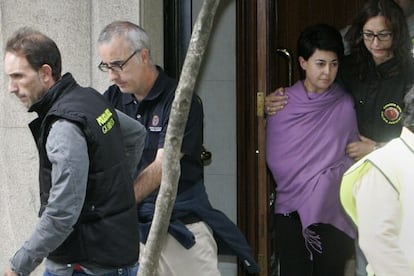Witnesses place third Asunta suspect 600km from Galicia on night of murder
Investigation into killing of 12-year-old plagued by complications and leaked evidence

The investigation into the murder of 12-year-old Asunta Basterra in Santiago de Compostela in September, in which her adoptive parents Rosario Porto and Alfonso Basterra are the main suspects, has turned into a puzzle that is proving difficult to crack, thanks to irrefutable evidence coming up against imprecise and contradictory testimonies.
Among the key elements in the elaborate judicial casefile are the laptop and cellphone of the 12-year-old’s father, which were unexpectedly found where investigators had already searched, suggesting the help of an anonymous collaborator who had snuck into Basterra’s apartment. Both he and his ex-wife Porto remain in custody.
A third man, whose semen was discovered on Asunta’s t-shirt but whom several witnesses place far from Galicia on the night of the crime, also remains an official suspect.
On Wednesday, the man’s girlfriend testified via videoconference from a court in Navalcarnero, Madrid, that the couple had spent that afternoon shopping for a wedding suit along with other relatives. Three shopping mall employees also testified that they had seen the man that Saturday.
The man’s lawyer said they would also submit a store receipt and photos from the Facebook social network, with time and date, showing him dining 600 kilometers away from Santiago. The autopsy estimated that Asunta died after being asphyxiated in woodland area in the Galicia region between 4pm and 8pm that day.
The investigators believe the semen may have ended up on the clothes as the result of contamination in the laboratory, but neither the Civil Guard in A Coruña or Madrid have accepted responsibility for such an error.
The association Clara Campoamor, which has brought a popular case against Asunta’s parents, is satisfied that the explanations provided by the witnesses for the third man rule out his involvement. But Porto’s defense has continued to call the young man’s alibi into question, saying his girlfriend changed her version of events “at her convenience.”
Lawyer José Luis Gutiérrez Aranguren said his client would also be filing a suit against her former psychiatrist “for a charge of revealing very obvious secrets” about Porto.
Aranguren himself has been the subject of a Civil Guard complaint after accusing investigators of pressuring witnesses into changing their versions of events and underpinning the case against Asunta’s parents.
Tangles and leaks
Three-and-a-half months after Asunta’s death, Judge José Antonio Vázquez Taín is trying to move forward a case that is getting tangled up almost at the same rate as its key evidence — legal documents, images, videos, audio recordings — is being passed to media outlets, despite watermarks on all copies aimed at avoiding such leaks.
On Wednesday Taín filed a complaint to investigate “the origin of the recordings broadcast by various media outlets,” the Galicia regional High Court said. He did so just a few hours after a TV show played audio extracts of the conversation Porto and Basterra had in the Civil Guard cell just after they were arrested, when they already knew that they might be being recorded.
Tu suscripción se está usando en otro dispositivo
¿Quieres añadir otro usuario a tu suscripción?
Si continúas leyendo en este dispositivo, no se podrá leer en el otro.
FlechaTu suscripción se está usando en otro dispositivo y solo puedes acceder a EL PAÍS desde un dispositivo a la vez.
Si quieres compartir tu cuenta, cambia tu suscripción a la modalidad Premium, así podrás añadir otro usuario. Cada uno accederá con su propia cuenta de email, lo que os permitirá personalizar vuestra experiencia en EL PAÍS.
¿Tienes una suscripción de empresa? Accede aquí para contratar más cuentas.
En el caso de no saber quién está usando tu cuenta, te recomendamos cambiar tu contraseña aquí.
Si decides continuar compartiendo tu cuenta, este mensaje se mostrará en tu dispositivo y en el de la otra persona que está usando tu cuenta de forma indefinida, afectando a tu experiencia de lectura. Puedes consultar aquí los términos y condiciones de la suscripción digital.








































